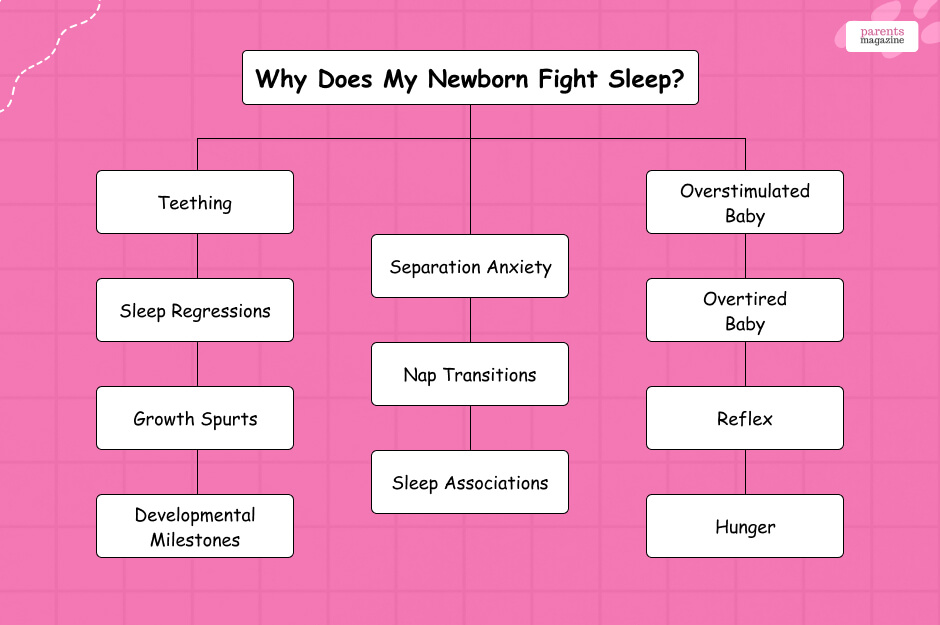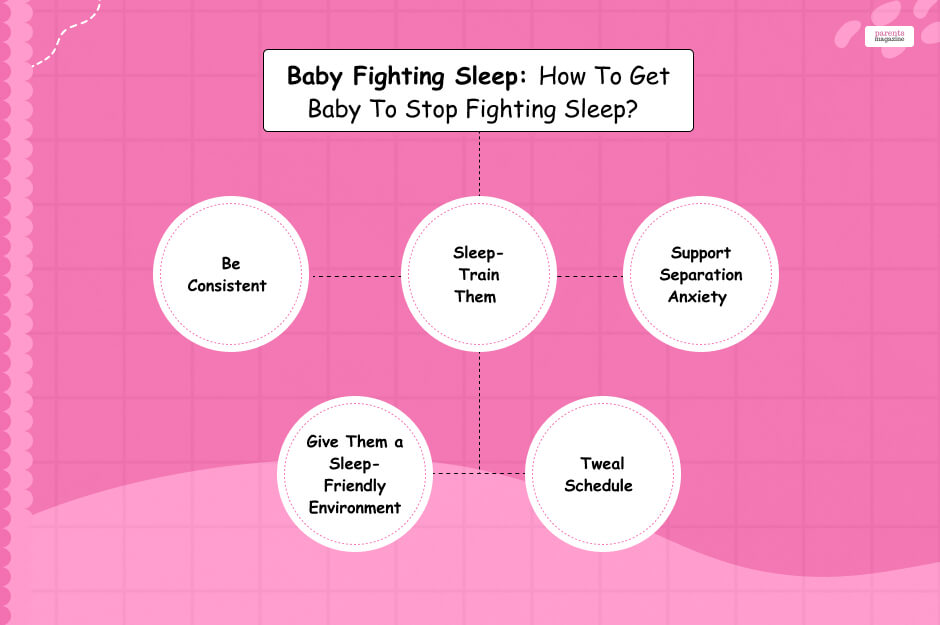
Baby Fighting Sleep: Reasons And Remedies
As a new parent, it is difficult to manage your baby’s sleep cycle and align it with your baby. Parents look up to the time when their baby falls asleep, as that is the only time they get for themselves and manage their daily chores as well.
However, you will often notice your baby fighting sleep. The moment you think they have fallen asleep and you can move ahead with your work, they wake up. This is one of the major struggles that you have to go through in the first few years.
Even if it gets frustrating sometimes, you have to think of the reason. There are numerous answers to the question of why is my baby fighting sleep. When you know the reason, you will be able to handle the situation better and comfort them in the best possible way.
Why Does My Newborn Fight Sleep?

I am sure when you were pregnant people often told you that you were not going to get enough sleep in the coming few months or years. This is because babies are known for their irregular sleep patterns and newborns fighting sleep is quite common as well.
A newborn fighting sleep can have various reasons and the reason keeps changing with their air. Moreover, it depends on their sleep patterns and their routine. Even though this phase is temporary, if you are concerned feel free to reach out to your pediatrician.
Here are the possible reasons for baby fighting sleep mentioned.
Teething
If you are worried about your baby fighting sleep, teething could be one of the possible reasons. This starts around 6 months, but in some cases, it starts from four months. Some have late teething as well. This causes them discomfort and pain, making the baby resist sleep.
Sleep Regressions
This is a part of the baby’s development and happens regularly over the first year. Starts around 4 months, and then they have the 8-month sleep regression. Every time this lasts for around 2-6 weeks. You have to be patient with your baby in this phase.
Growth Spurts
In the first year of your baby’s life, they will go through different growth spurts that mess with their sleep patterns and they fight sleep. They tend to wake up multiple times during this phase.
Developmental Milestones
When a baby reaches a new milestone like sitting up, rolling over, and crawling, they get more active and tend to fight sleep. They practice their newly developed skill all through the night.
Separation Anxiety
In between the 7 to 9 months, separation anxiety kicks in for most babies. They become clingier and the moment you leave them in their crib they start crying their heart out. The moment you go out of their sight, they will look for you.
Nap Transitions
If your baby is sleeping a lot during the day, they will resist sleeping at night. If their wake windows get longer, then they might take a nap in between and then again stay awake.
All you need is an age-appropriate sleep schedule. The schedule they had at 6 months would be different from a 15-month sleep schedule.
Sleep Associations
Babies more than 4 months of age often have sleep association, like they would need their pacifier, or they need to be rocked to sleep. This makes it difficult for them to sleep independently.
Overstimulated Baby
Bright screens, busy households, or beeping toys can get too much and can result in overstimulation. This makes a baby fight sleep. Try to avoid all kinds of stimulating activities before their bedtime.
Overtired Baby
When a baby is overtired, they fight to sleep. They are so tired that they find it difficult to settle down. You must investigate it, so they don’t get excessively tired.
Reflex
Baby fighting sleep because of reflux is common. This happens when the stomach contents flow back to the esophagus. This not only causes them difficulty sleeping, but they often spit up and get fussy about it.
Hunger
One major and common reason for babies to wake up frequently, and fight sleep is because they are still hungry. During the first months, they have a small stomach, and they need to be fed frequently.
Baby Fighting Sleep: How To Get Baby To Stop Fighting Sleep?

Even if everything is not in your hands, there are certain things you can try to help your baby sleep peacefully.
Be Consistent
You have to be consistent with their sleep schedule, bedtime routine, and sleep environment. Prepare a bedtime schedule for your baby according to their age, and make sure you follow them every day.
Sleep-Train Them
This is not for every parent. However, some find this to be the solution to their baby fighting sleep. When a baby knows that their resistance will bring them your attention, they will do it even more. So, pick an appropriate sleep-training method for your little one.
Support Separation Anxiety
If your baby is suffering from separation anxiety, do not try to leave when they fall asleep. Instead, let them know that you have their back. Moreover, let them know that you will get back to them after a while. They do get them relaxed.
Give Them a Sleep-Friendly Environment
Providing them with a sleep-friendly schedule will help them fall asleep faster. Give them a quiet, cool, and dark place to get them relaxed and sleep well. Ensure that the temperature is ideal. Moreover, you can use a white noise machine to avoid any other noise.
Tweak Their Schedule
If your baby is fighting for sleep, because they are not tired enough, then drop a nap, or shift their bedtime. Moreover, if they sleep too much during the day, they will fight sleeping at night.
Myths & Facts About Baby Sleep Resistance

You will often come across people randomly throwing facts that could not be more wrong. The situation is the same with the baby fighting sleep. Various myths have been going around about this matter. Let’s check the most common ones.
| Myth | Fact |
|---|---|
| Babies will sleep better if they are kept awake for a longer time. | This might make the baby overtired, which will cause them discomfort to settle down. |
| Let them cry themselves to sleep. | This can make them restless, and they often suffer from separation anxiety as well. This is not a solution for every parent. |
| If they sleep during the day, they will stay awake during the night. | Every baby has a sleep schedule and not necessarily it is the same for everyone. |
| Babies less than 6 months of age cannot sleep through the night. | Their ability to sleep through the night depends on various factors like their environment, food habits, whether they are swaddled, etc. |
Safety Tips for Better Baby Sleep

It might have taken a lot of effort to get that naughty one to bed. Here are some of the tips, to ensure their safety while they are sleeping.
- Always put your baby on their back while sleeping.
- Ensure that you are using a flat and firm surface like a bassinet or a crib.
- Give them their own space to sleep. Try not to share your bed with your child.
- Do not keep any soft objects, loose clothes, toys, and other items close to their sleeping area.
- Maintain the temperature of the room. Do not let your little one get too hot.
- Do not keep any wires and cables near their crib.
- You can use a pacifier. It is known to help them soothe.
Frequently Asked Questions
When discussing the topic parents often ask these few questions. Let’s take a look at those.
When your baby is overtired, they will get fussy, they will often yawn, cry, and arch their back. They will stare into space, and their arms and legs might also move uncontrollably.
Experts mostly recommend sleep training between the 4th and 6th month. You should do this when they have a proper sleep schedule and can self-soothe.
You should feed your baby when they are asking for it, or when they are hungry and not every time they wake up. Moreover, when in confusion, consult your pediatrician.
Yes, every baby is different, and so is their need for sleep. Some babies generally sleep less than others. This is like how adults have different sleep needs.
Yes, teething or any other kind of illness can cause your baby to fight sleep. Sometimes, they are in pain and find it difficult to soothe themselves.
Have a Plan
Even though baby fighting sleep is just a phase, and there could be various reasons behind it, there are times when parents get worried. Whatever the reason behind this resistance is, try to be consistent with your sleep schedule.
This way, they will have a routine and will automatically crave sleep when it is their bedtime. However, identifying the issue is important. This will help you find a more optimized solution to get to sleep.
Already have an account?
Sign In
Create your account
User added successfully. Log in









